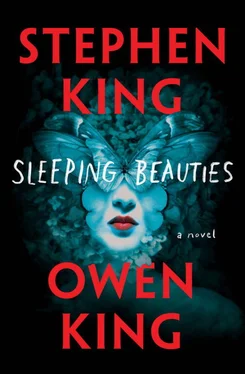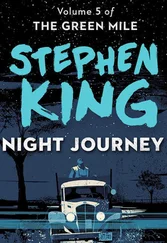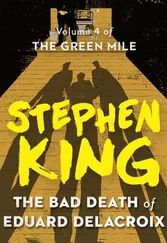When he was in the same room with the baby, it grinned at him, as if it wanted to make friends. Clint grinned back and found himself crying in his car on the way to work.
One night, unable to sleep, he Googled the name of his second patient, Paul Montpelier, he of the “sexual ambition.” An obituary popped up. Paul Montpelier had died five years before, after a long battle with cancer. There was no mention of a wife or children. What had his “sexual ambition” gained him? A very short and sad obituary, it seemed. Clint cried for him, too. He understood this was a well-known psychological phenomenon known as transference , and didn’t care.
One rainy evening not long after reading Montpelier’s obituary, exhausted from a day of group meetings and one-on-one consultations, Clint stopped at a motel in the little town of Eagle, where the heater rattled and everyone on the TV looked green. Three nights later, he was in the same room when Lila called his cell phone to ask if he was coming home. She didn’t sound particularly concerned about his answer.
“I think I’m beat, Lila,” he said.
Lila heard his meaning, the larger encircling defeat it conveyed.
“You’re a good man,” she said. This was a lot to give him right then. The baby didn’t sleep much. She was beat herself. “Better than most.”
He had to laugh. “I believe that’s known as damning with faint praise.”
“I do love you,” she said. “It’s just been a lot. Hasn’t it?”
It had. It had been a hell of a lot.
15
The warden at Curly told Clint he absolutely didn’t want to see his face over the Thanksgiving holiday.
“Heal thyself, Doc,” said the warden. “Eat some vegetables, anyway. Something besides Big Macs and moon pies.”
He abruptly decided to drive to Coughlin to see Shannon, but ended up parked outside her house, unable to go in. Through the thin drapes of the ranch house he observed the shadows of female figures moving. The warmth of the lights was cheerful and inviting; snow had started to fall in huge flakes. He thought of knocking on her door. He thought of saying, Hey, Shan, you were the milkshake that got away . The thought of a milkshake running away on Shannon’s shapely legs made him laugh, and he was still laughing when he drove off.
He ended up in a tavern called O’Byrne’s with melting slush on the floor, the Dubliners on the jukebox, and a bleary-eyed, white-headed bartender who moved in slow motion between the taps and the glasses, as if he were not pouring beers, but handling radioactive isotopes. This fine fellow addressed Clint. “Guinness, son? Tasty on a night like this.”
“Make it a Bud.”
The current Dubliners tune was “The Auld Triangle.” Clint knew it, and sort of liked it, in spite of himself. There was a romance to the song that was nothing like his experience of prison, but it got you, those voices gathering. Someone, he thought, ought to add another verse, though. The warden, the screw, and the lag all got turns. Where was the shrink?
He was just about to take his beer to a dark corner when a finger tapped him on the shoulder. “Clint?”
16
What did it was the hug.
Frank’s daughter didn’t just hug him when they were reunited, she dug her girl’s hands into his upper arms so that he could feel her fingernails through his shirt. Everything that had happened, everything he had done, had made it clear that he needed to do something—anything!—about himself, but that hug had tipped the dominoes. The last time he had seen her awake, he had almost ripped her favorite shirt off her body. His daughter loved him anyway. He didn’t deserve it—but he wanted to.
The anger management program was three days a week. At the first meeting, it was just Frank and the therapist in the basement of the Dooling VFW.
Her name was Viswanathan. She wore large round spectacles and was so young-looking Frank figured she didn’t remember cassette tapes. She asked why he was there.
“Because I scare my kid and I scare myself. I also trashed my marriage, but that’s just a side-effect.”
The therapist took notes as he explained his feelings and compulsions. It came more easily than Frank would have guessed, sort of like expressing pus from an infected wound. In a lot of ways, it was like talking about another person, because that pissed-off dogcatcher didn’t feel like him. That pissed-off dogcatcher was someone who showed up and took control when Frank didn’t like what was happening, when he just couldn’t deal. He told her about putting animals in cages. He kept coming back to that.
“My friend,” said Dr. Viswanathan, this twenty-six-year-old girl with glasses the color of Kool-Aid, “have you ever heard of a drug called Zoloft?”
“Are you patronizing me?” Frank wanted to get himself together, not be fucked with.
The therapist shook her head and smiled. “No, I’m being jaunty. And you’re being brave.”
She introduced him to a psychopharmacologist and the psychopharmacologist wrote Frank a prescription. He took the prescribed dosage without feeling especially different and continued to go to the meetings. Word got around, and more men began to appear, filling half the chairs in the basement of the VFW. They said they “wanted to make a change.” They said they “wanted to get their shit together.” They said they “wanted to stop being so fucking angry all the time.”
No amount of therapy or Big Pharma happy-pills could change the fact that Frank’s marriage was kaput. He had broken Elaine’s trust too many times (not to mention the kitchen wall). But maybe that part was okay. He discovered he didn’t actually like her that much. The best thing was to let her go. He gave her full custody, and told her he was grateful for his two weekends a month with their daughter. In time, if things went well, it would be more.
To his daughter he said, “I’ve been thinking about a dog.”
17
“How are you doing?” Frank asked Clint as the Dubliners played and sang.
Frank was on his way to Thanksgiving in Virginia with his former in-laws. The Zoloft and the meetings helped him control his temper, but in-laws were still in-laws, only more so when their daughter had divorced you. He’d stopped in at O’Byrne’s to postpone his execution for a half hour.
“I’m hanging in there.” Clint rubbed his eyes. “Need to lose some weight, but yeah, hanging in there.”
They took seats at a booth in a dark corner.
Frank said, “You’re drinking in an Irish dive on Thanksgiving. Is that your idea of hanging in there?”
“I didn’t say I was great. Besides, you’re here, too.”
Frank thought What the hell and just said it. “I’m glad we didn’t kill each other.”
Clint raised his glass. “I’ll drink to that.”
They toasted. Clint didn’t feel any anger toward Frank. Anger wasn’t something he felt toward anyone. What he felt was great disappointment in himself. He had not expected to save his family only to lose them. It was not his idea of a happy ending. It was his idea of an American shit-show.
He and Geary talked about their children. Frank’s girl was in love with some kid in Ohio. He was a little worried he might be a grandfather at forty-five, but he was playing it cool. Clint said that his son was awfully quiet these days, probably couldn’t wait to blow town, go to college, see what the world was like beyond coal country.
“And your wife?”
Clint waved to the bartender for another round.
Frank shook his head. “Thanks, but not for me. Booze and Zoloft don’t mix all that well. I should shove off. The outlaws are expecting me.” He brightened. “Hey, why not come along? I’ll introduce you to Elaine’s folks. Gotta keep on their good side; they’re my daughter’s grandparents, after all. Visiting them is sort of like hell, but with slightly better food.”
Читать дальше











